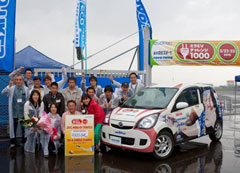Japanese auto enthusiast’s run laptop battery-powered EV for 1,000km
27 May 2010
As global auto manufacturers struggle to develop an electric vehicle (EV) battery to run beyond 200km on a single charge, a group of electric vehicle enthusiasts in have Japan managed to run an electric vehicle more than 1,000kms on a single charge, thus breaking their own previous Guiness record.
 |
| Photo Credit: Japan Electric Vehicle Club |
What is more remarkable is that these enthusiasts from the Japan Electric Vehicle Club (Japan EV Club) used 8,320 cylindrical lithium-ion laptop batteries to run the Mira EV for 1,003.84km for almost 28 hours at an average speed of around 40km/h on a single charge.
In comparison, Japan's third-biggest carmaker's Nissan's upcoming electric vehicle the 'Leaf', priced just under €30,000, runs only for 100km on a single charge. (See: Nissan prices EV Leaf under €30,000 in Europe)
This bunch of EV enthusiaists have been able to crack the barriers of EV battery - something the collective skills of highly paid engineers at Toyota, General Motors, Daimler, Nissan or even the Chinese electric car maker BYD, in which Warren Buffett has invested immense faith and money, could not.
The Japan EV Club had taken a Daihatsu Mira model car and replaced its petrol engine with an electric motor and powered the car with 8,320 cylindrical Sanyo lithium-ion batteries used in computer laptops.
They took the Mira EV to a race track of a training school for auto racers in Shimotsuma, Ibaraki on 22 May and seventeen drivers took turns in driving it for 27.5 hours at an average speed of 25 mph (40 kph).
They drive lasted 1,003.84 kms (623.76 miles) without recharging, breaking their own previous record of 555.6kms (345 miles) set last November.
By using the same number of batteries this time, the Japan EV Club was able to double the distance the Mira EV ran on a single charge after some modifications in just a few months.
Although the Japan EV Club were not able to get the EV speed higher than 25 mph, which is not practical in driving in traffic roads or the impractical and costly computer laptop lithium-ion batteries, their achievement has to be applauded since they proved that an EV can go the distance on a single charge.


















